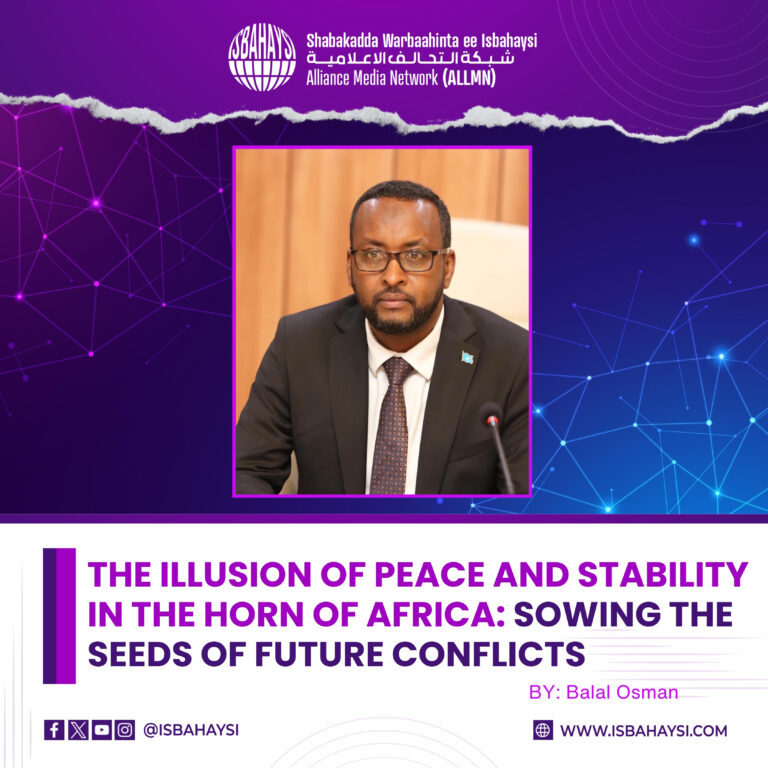
In his address to the Ethiopian Parliament on the 31st of October 2024, Ethiopian Prime Minister Dr Abiy Ahmed reaffirmed Ethiopia’s unwavering intent to access to the Red Sea – “by hook or by crook”. Although he claimed a commitment to achieving this goal peacefully, he in the same breath stated that “if we don’t achieve this ambition [NOW], our children will” furthermore, he jokingly dismissed Somali government’s legitimate concerns regarding Ethiopia’s illegal agreement with the Somaliland region of Somalia, undermining Somali sovereignty and disregarding Somali’s objections to such unilateral actions.
In an evolving global strategic trend amidst influential shifts in world security, emerging alliances, rising militarization and the shifting roles of great powers, peaceful and stable Horn of Africa seems a distance illusion, particularly, when the political discourse is “if we do not succeed, our children will succeed or Ethiopia will gain access to the red sea by hook or by crook”. In recent years, the Horn of Africa has emerged as both a focal point of strategic geopolitical interest and a complex tapestry of intertwined ethnic, political, and economic dynamics, yet, the region’s apparent peace and stability is, in many ways, an illusion masking the fragility that lies beneath. At the heart of this precarious state is a narrative advanced by current Ethiopian leader who, with the rhetoric of “if we do not succeed, our children will succeed,” sow the seeds of future conflict by alluding to ambitions of territorial access to the Red Sea “either by hook or the crook”. These statements, often interpreted as suggesting the annexation of Red Sea from neighbouring countries—particularly Somalia —raising crucial concerns about peace and stability in the region now and in the future.
The Horn of Africa, comprising countries like Ethiopia, Somalia, Eritrea, and Djibouti, is one of the most volatile regions in Africa, if not the world. For centuries, it has been a crossroads of trade, culture, and conflict, marked by colonial legacies, political instability, and inter-ethnic tensions. It is also a region with immense strategic value due to its proximity to the Red Sea—a key global maritime corridor connecting the Indian Ocean with the Mediterranean Sea via the Suez Canal. Control of, or even unfettered access to, this waterway is a significant economic and military advantage. The Ethiopian PM’s rhetoric about future generations completing any unachieved goal of Red Sea access adds another layer of complexity. These narrative risks perpetuating a cycle of conflict, conveying the message that territorial expansion is an aspirational and even legitimate goal for Ethiopia, risking encouraging young Ethiopians to see territorial disputes as part of their national duty, potentially setting the stage for future hostilities. In contrast, Somalis who have steadfastly held on to the dream of Pan-Somalia, which endures in the hearts of all Somalis – a vision of a united Pan-Somalia encompassing territories they consider lost in the hand of colonial powers – but recently appeared to be diminishing, will undoubtedly reverberate more powerfully, if Ethiopia continue to pursue further expansionist ambitions toward Somali territories. The successive Somali governments have, in recent years, demonstrated commitment to fostering a cooperation and constrictive relationship with Ethiopia, advocating for peaceful coexistence and mutual respect as neighbours. This positive approach offered an opportunity for change, however, in light of Ethiopia’s recent expansionist ambitions, it is evident that Ethiopia has misinterpreted Somali’s goodwill gesture, choosing instead to persist with imperialistic goals.
Indeed, Horn of Africa’s stability is of critical importance not only to the countries in the region but also to regional and global powers with vested interests in the region’s security and access routes, hence, Red Sea is a major artery of global trade, and any escalation in conflicts over its access could have severe implications for international maritime security and economic stability.
Countries like the United States, China, and those in the European Union are increasingly involved in the Horn, whether through military bases, diplomatic missions, or development aid.
If Ethiopia continues to use language that alludes to territorial ambitions, there is a risk that it could provoke defensive reactions from Somalia. This could trigger a new arms race or lead to a build- up of alliances and counter-alliances – if not already happening – that would complicate the regional security architecture. International actors may find themselves in a difficult position, caught between supporting sovereignty and stability on the one hand and navigating the strategic alliances on the other.
For true stability in the Horn of Africa, the leaders of the region should work together to foster economic integration that benefits all nations rather than stoking intergenerational narratives of expansion and conquest. Similarly, other stakeholders must use their leverage and prioritize dialogue, economic cooperation, and respect for sovereignty over expansionist endeavours. Organizations like the African Union and the United Nations must play a proactive role in fostering dialogue and supporting peace initiatives in the Horn. Through multilateral efforts, Ethiopia and its neighbours could establish frameworks for shared use of resources, investment in infrastructure and collaborative security arrangements that lessen the need for any country to view territorial access as zero-sum.
In conclusion, the illusion of stability in the Horn of Africa cannot mask the underlying tensions that continue to simmer beneath the surface. If Ethiopian leadership truly aims to secure a prosperous future for their nation, it must focus on collaborative regional relationships rather than narratives of expansion. Only through mutual respect, partnership, and a commitment to peaceful coexistence can the Horn of Africa hope to transcend its legacy of conflict and achieve genuine stability.
________________
Author: Mr. Balal Mohamed Cusman, Former State Minister for Foreign Affairs and International Development of Somalia.
Email: [email protected]
X: @BalalCusman